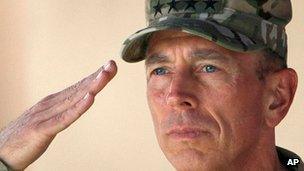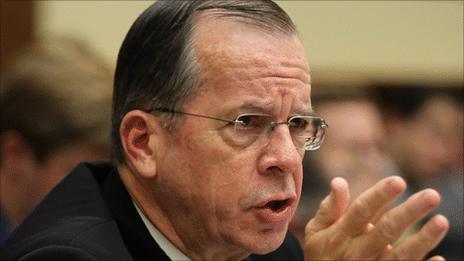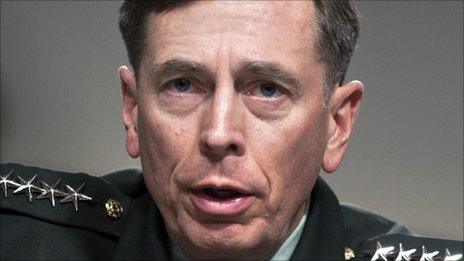General David Petraeus: A huge loss for US
- Published
- comments
Petraeus says Taliban momentum halted in key areas
The US has lost one of its most admired public servants - the man who came up with the plan which successfully got his country out of one unpopular war, and will get it out of another by 2014.
General David Petraeus took a remarkable amount of experience with him when he went to be the new head of the CIA just over a year ago.
He had commanded the international forces in both Iraq and Afghanistan, and was probably the cleverest and the most highly praised soldier of his time.

Gen David Petraeus created a new blueprint for fighting insurgencies
Gen Petraeus certainly had more experience of combating terrorism in its different guises than any other military or civilian figure in the Western world.
He rebuilt the entire counterinsurgency strategy of the United States, which had been almost a forgotten subject since the Vietnam war, and created a highly effective blueprint for fighting insurgencies.
For this amount of brain-power and strategic and tactical thinking to be lost to the United States because of an affair with his biographer will no doubt seem to many in Europe and the rest of the world to be completely disproportionate.
But this is not simply another example of the kind of Puritanism which bemuses non-Americans.
'I feel closer to SAS'
As the boss of the CIA, David Petraeus was expected to set an example to the people under his command, external; and extramarital affairs have often led to blackmail and other difficulties for intelligence workers in the past.
Once the FBI had uncovered the evidence for his affair and told him, it probably never occurred for a moment to Gen Petraeus that he might be able to hold on to his job.
As I found over the years, both in Iraq and Afghanistan, Gen Petraeus is a very pleasant and witty man, as well as a highly intelligent one.
An anglophile and a member of the American special forces, he visited the headquarters of the SAS in Hereford and often praised its way of doing things.
"I sometimes feel closer to the SAS than anyone else," he once told me in private. It may not just have been politeness on his part.
His toughness, perhaps even cynicism, served him well in Baghdad and Kabul as well as Washington.
When the American forces were becoming badly bogged down in Iraq, with faulty tactics, nothing much in the way of strategy, and visibly declining morale, Petraeus stepped in and changed everything.
"Of course it's possible to win this war," he told me crisply in 2007, "and I intend to do it."
Iraq war victor?
Whether the United States and its partners did win the war in Iraq is debatable; but it is certain that General Petraeus gave American public opinion the feeling that they had.

General Petraeus conducted an affair with his biographer, Paula Broadwell
In politics, and to some extent in military matters, what counts is the way things are perceived, rather than how they actually are.
General Petraeus introduced the concept of the "surge" - a big rise in the number of US troops in Iraq.
This, combined with the increasing war-weariness among Iraqis, a growing dislike of Islamic extremism and a natural downturn in the insurgency, made Iraq a quieter place for a time.
He knew very well that once American forces were withdrawn from Iraq, the US news media would no longer be interested in what was going on there.
There was of course no end to the bombings and targeted killings after the Western troops pulled out, but scarcely anyone in the United States seemed to notice.
As far as they were concerned, Iraq had been solved.
When I put this scenario to General Petraeus he grinned broadly. "That's your interpretation and your language," he said, "but I might not quarrel too much with it."
Charm, wit, intelligence
Soon, under a new president, he was reversioning the plan to fit Afghanistan instead of Iraq.
He had been sent in to replace another highly intelligent and charming American general, Stan McChrystal, who was sacked after disparaging remarks about the Obama administration were reported by a magazine journalist.
When American, British and other Western troops are withdrawn from Afghanistan next year, it will be according to the basic plan drawn up by General Petraeus.
And once more the world's news media will no doubt forget about the country that has been left behind.
David Petraeus's charm, wit and incisive intelligence will not be unemployed for long in Washington.
General McChrystal, who once told me he would like to open a bookshop somewhere, is now a leading defence consultant.
As a former head of the CIA, Mr Petraeus will be in even greater demand.
For a time, people pestered him with questions about plans to go into politics.
He is too self-aware to do that, and anyway the circumstances of his resignation would probably make it impossible.
He has most of the qualities of a first-rate politician, but not the instincts. He was the best American general for a generation; now he is the worst loss to his country for longer than that.
- Published10 November 2012

- Published23 April 2015

- Published23 June 2011

- Published31 August 2011
